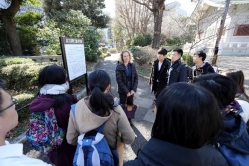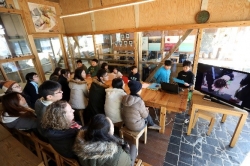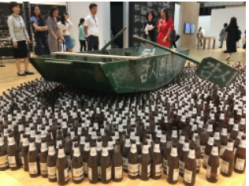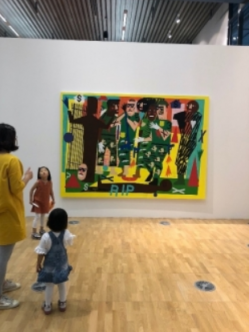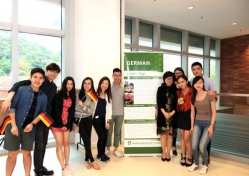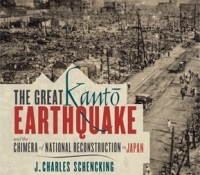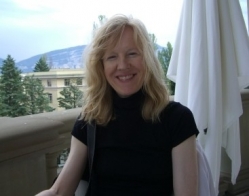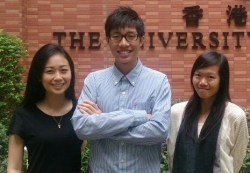Knowledge Exchange
Faculty KE Award
The Faculty Knowledge Exchange (KE) Awards were introduced in 2011 in order to recognise each Faculty's outstanding KE accomplishment that has made demonstrable economic, social or cultural impacts to benefit the community, business/industry, or partner organisations.
Faculty KE Award recipient in 2021:
|
|
Dr Janet BORLAND Project Description: Dr. Janet Borland’s research challenges the popular idea that Japanese people owe their resilience in the face of disaster to some innate sense of calm. Japan’s contemporary culture of preparedness is the result of learned and practiced behaviors that began in earnest after the 1923 Great Kantō Earthquake. Children, schools and education were the primary tools through which experts sought to build a disaster-prepared society and nation. Through diverse and far-reaching activities such as a joint initiative with Mitsubishi Corporation, field trips, photo exhibitions, media engagement, and a Discovery Channel TV documentary, Borland has made significant contributions to raising public awareness about disaster response, the experiences of children caught up in these traumatic events, and the role of children as agents of recovery and resilience with voices to be listened to and learned from in post-disaster communities. |
Faculty KE Award recipient in 2020:
|
|
Dr Yeewan KOON Dr. Yeewan Koon’s co-curated exhibition for the 12th Gwangju Biennale, Faultlines, presented contemporary artworks in response to the biennale’s theme of Beyond Borders. The exhibition looked at the histories of “hidden” fractures that are embedded within our society and continue to create borders of exclusions. Dr. Koon conceived and produced a show that resulted in new cultural experiences and deeper understanding for the Biennale’s 320,000 visitors between September and November 2018. The impact of the project included making an exhibition that transformed audience’s understanding of borders - a subject of global importance and relevance; working with local communities and international artists; developed the exhibiting artists personally and professionally. This was achieved by working with artists to produce art that challenged their practices and provided an international platform to showcase it; by Koon’s commissioning of new, site-specific works; and by the production of an interactive library as an auxiliary part of the exhibition that extended audience engagement through self-learning. The Biennale also brought visitors from around the world to South Korea and received extensive press coverage and substantial international attention. |
Faculty KE Award recipient in 2018:
|
|
Dr Li CHONG The project aims to enhance the interest within the general Hong Kong community in learning the German language and understanding the country’s culture. Staff and students of the German Programme at the University of Hong Kong initiated outreach programmes benefitting local secondary school students in Hong Kong by organizing various German language and cultural workshops. It also generated a teaching and experiential learning opportunity for German Programme university students. Through research outputs, talks open to public and workshops, the project has significantly raised awareness of the value of foreign language and culture within the wider community, reaching thousands of local and international professionals and secondary school students and instigating policy and educational changes. |
Faculty KE Award recipient in 2017:
|
|
Professor Charles Schencking This project aims to raise public awareness about disaster response with the case study of the Great Kantō Earthquake of 1923. Professor Charles Schencking’s research has revolutionized the understanding of how the Japanese have experienced, responded to, and recovered from catastrophic natural disasters over the past 100 years. Innovative research outputs - an interactive website including a publicly accessible image and map archive (www.greatkantoearthquake.com), a museum exhibition, and a Discovery Channel TV documentary - have introduced millions of people from a wide variety of backgrounds to how the Japanese have interpreted, constructed, and learned from natural calamities and become world leaders in disaster response, recovery, and resilience. |
Faculty KE Award recipient in 2016:
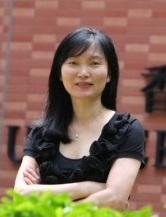 |
for the "Resources for Interpreting" project This project aims to develop a one-stop web-based resource for the practice, teaching and research of interpreting. By building a website which compiles training and reference materials, including a bilingual Chinese/English vocabulary database on current affairs, this project will benefit professional interpreters and those aspiring to be interpreters, trainers of interpreters and researchers of interpreting studies, translation and interpreting students, and the general public, including language learners and interpreting service users. (details) Website: http://www.interpreting.hku.hk/ |
Faculty KE Award recipients in 2015:
|
|
Dr Alexandra COOK and Team Members: for the " Take Action! Youth Biodiversity Conservation Leadership Training Scheme" project This project brought together postgraduate students from the Faculties of Arts, Science and Social Sciences in an interdisciplinary effort to promote local biodiversity education. It aims to inspire local high school students and make them aware of their own impact on the environment. The Scheme included four full-day sessions held over 5 months in 2014 and involved 64 students from 16 local secondary schools. It gained recognition from the Agriculture, Fisheries and Conservation Department as a Biodiversity Strategy and Action Plan - Public Awareness and Engagement event and was supported by the Conservancy Association. The Scheme has been continued in 2015. Website: http://takeactionhk.wix.com/hku-ke#!-past-year-2014/cc69 Youtube video: https://www.youtube.com/watch?v=uL4EbKEkvno&feature=youtu.be Press release: http://www.hku.hk/press/press-invitations/detail/11342.html KE newsletter: http://www.ke.hku.hk/newsletter/issue9/features_2B |
Faculty KE Award recipient in 2014:
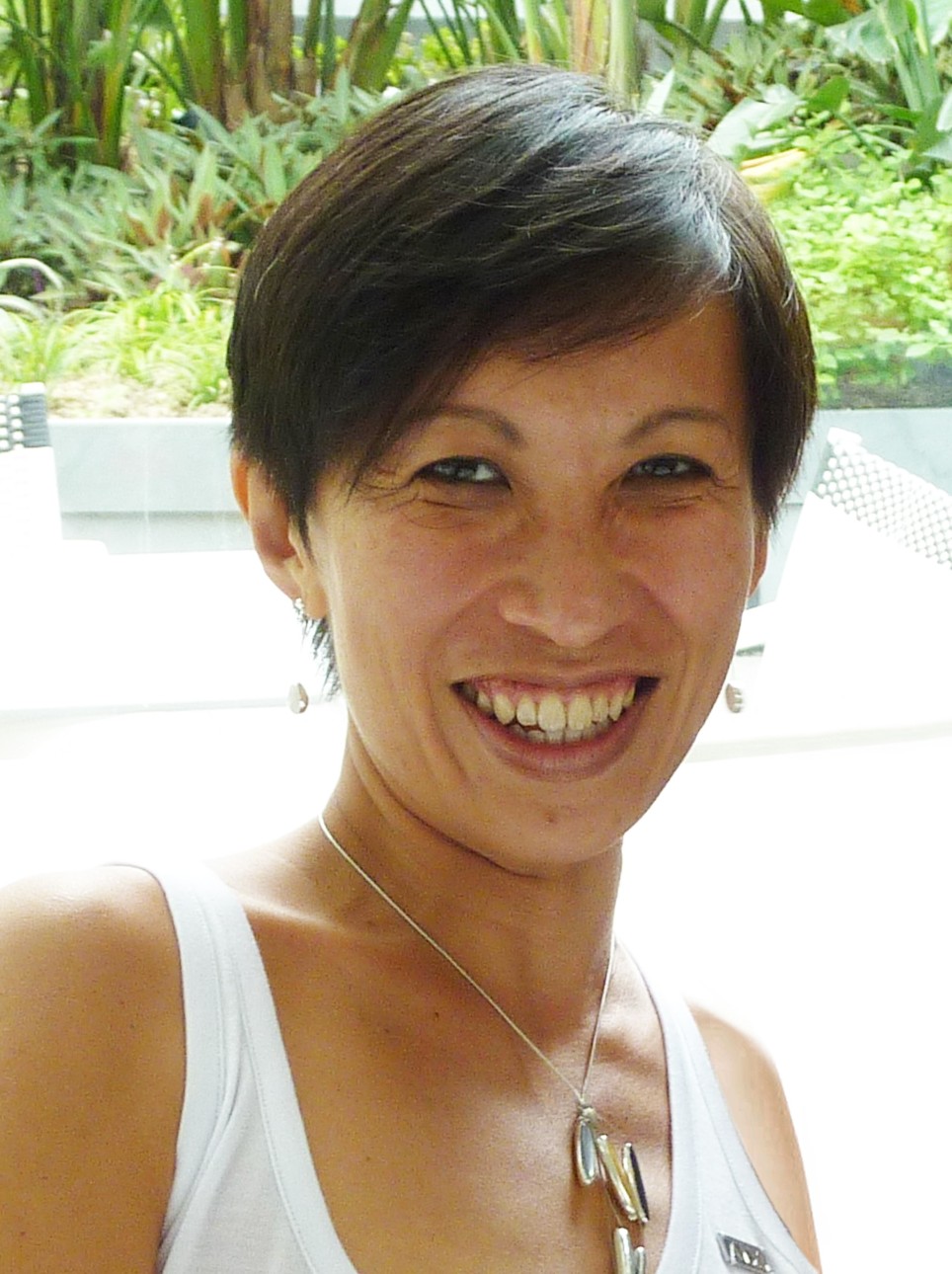 |
Dr Lisa LIM This project further develops the website LinguisticMinorities.HK – a one-stop resource on the linguistic situations of ethnic minorities in Hong Kong such as traditional minorities like Tanka and Weitou communities, Hakka, Hokkiens, and South Asians, and newer groups such as Indonesian and Filipina domestic workers and the African community – by including case studies, interviews, audio and video clips of the minority community members, making an even more direct link with the communities concerned. The website http://linguisticminorities.hk/ was launched in July 2013. (Details) |
Faculty KE Award recipient in 2013:
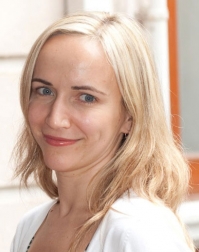 |
Dr Olga A. ZAYTS The project aims to raise public awareness about genetic disorders by developing up-to-date and Hong Kong-specific client information sources (information leaflets and a website) about a range of genetic conditions. The project team will work with professional and client focus groups and local media to diseminate information about the importance of timely diagnosis and preventative measures. (Details) |
Faculty KE Award recipients in 2012:
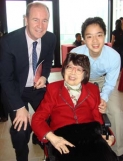 |
Dr Peter CUNICH The Witness to War project involves secondary school students interviewing elderly family members about their war experiences and recording and transcribing the interviews. The best ones are selected by the Department of History to be placed in the University Archives. (Details) |
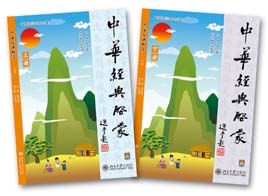 |
Dr Chung Mou SI In conjuction with this project, a series of books on Chinese culture was developed for junior and senior primary, and junior and senior secondary, and tested in schools since 2003. The feedback from teachers, students, parents, and principals, plus academic experts in 10 different countries, was used to revise the texts which are now available in nearly 1,000 primary and secondary schools in Hong Kong. (Details) |
Faculty KE Award recipient in 2011:
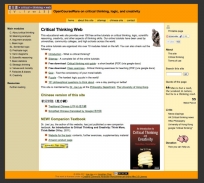 |
Dr Joe Y F LAU The Critical Thinking Web is a remarkable resource that offers online tutorials and resources to anyone who wants to learn more about critical thinking and improve their skills in evaluating knowledge. It’s a live example of the concept of free and open education, offering the fun and the serious: the world’s hardest logic puzzle, a quiz to test the consistency of your moral beliefs, self-learning modules on basic logic, scientific reasoning, strategic thinking, creativity and other concepts, a downloadable mini-guide on critical thinking, and many other materials. (Details) |


